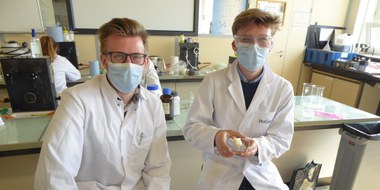Turning bread waste into biobased packaging
(15-07-2021) With their biobased packaging idea Loaf Foam won the national final of the Bio-based Innovation Student Challenge (BISC-E), organized by the End-of-Waste/RE.SOURCE.BIO and GREEN-CHEM networks at AUGent.
Loaf Foam, a team of students from HoGent, won the national final of the Bio-based Innovation Student Challenge (BISC-E), organized by the End-of-Waste/RE.SOURCE.BIO and GREEN-CHEM networks at AUGent. Therefore, they will be the Belgian representative to pitch their idea for biobased packaging at the final of this biobased European Championship later in the year.
Would it not be great to turn bread waste into a useful product? That was what a team of students thought when they started Loaf Foam. They want to convert this waste into a useful biobased packing peanut to replace the plastics, such as Expanded PolyStyrene (EPS), that are conventionally used as packaging protection. Packing peanuts are a common loose-fill packaging and cushioning material used to prevent damage to fragile objects during shipping.
How does it work exactly? Niels Sioen, the team lead, explains: “After many experiments in my mother’s kitchen, including ruining some of her pots & pans, we were able to extract the starch from bread waste and use it as a base for the packing peanuts”. While normal EPS peanuts are soluble in acetone, starch-based peanuts are soluble in water, so starch based products could in theory just be disposed down the sink, dissolving on contact with water.
This team of students turned their idea into a business case and thanks to the coaching of the End-of-Waste/RE-SOURCE.BIO and the GREEN-CHEM networks at AUGent, they reached the final of the Bio-based Innovation Student Challenge-Europe (BISC-E). Now they want to further prove the techno-economic feasibility and the sustainability of their solution to take actual steps towards creating a start-up to commercialize their idea. “We never thought that we could turn this student project into an actual business, but look at us now”, explains Niels. “We will even invest the prize money of the national final into more R&D experiments.”
The final will be hosted by the Bio-based Industries Consortium (BIC) at its annual gathering of top bio-based industry experts in the fall. The actual location in the EU still needs to be disclosed, but the team sure hopes for something hot and sunny. Once there, Loaf Foam will have to compete with teams of about 10+ other EU member countries to try and bring home the biobased European Championship trophy. This includes a financial award of 5000€, a free one-year membership to BIC and a lot of publicity as the competition really aims to bridge the knowledge gap between students and bio-based materials.
Hopefully the story of Loaf Foam will inspire even more students and more countries to participate to the next edition of this European BISC-E competition. The goal of this competition is to move forward to actual entrepreneurship! Of course, we are here to help: if you want to start your own national bio-based innovation student competition and/or have a team of students working on relevant projects, you can contact: nathan.degeyter@ugent.be.
